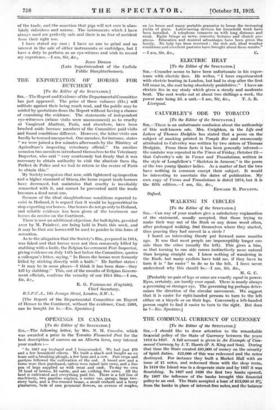THE EXPORTATION OF HORSES FOR BUTCHERY
[To the Editor of the SPECTATOR.]
Sin,—The Report and Evidence of the Departmental Committee has just appeared. The price of these volumes (31s.) will militate against their being much read, and the public may be misled by quotations from the Report without having a chance of examining the evidence. The statements of independent eye-witnesses (whose visits were unannounced) as to cruelty at Vaugirard Abattoir, Paris, and elsewhere, have been brushed aside because members of the Committee paid visits and found conditions different. However, the latter visits can hardly be termed unexpected. One member, for instance, states " we were joined a few minutes afterwards by the Ministry of Agriculture's inspecting veterinary official." On another occasion two members introduced themselves to the Veterinary Inspector, who said " very courteously but firmly that it was necessary to obtain authority to visit the abattoir from the Prefect de Police and we had to return to the centre of Paris to obtain this."
My Society recognizes that now, with tightened up inspection and a higher standard of fitness, the horse export trade horrors have decreased, but maintains that cruelty is inevitably connected with it, and cannot be prevented until the trade becomes a dead meat one.
Because of the ideal slaughterhouse conditions reported to exist in Holland, it is argued that it would be hypercritical to stop exporting our horses. Our horses do not go only to Holland, and reliable evidence has been given of the treatment our horses do receive on the Continent.
There is now an additional objection, for bull-fights, presided over by M. Painleve, are being held in Paris this week, and it may be that our horses will be used to pander to this form of sensation.
As to the allegation that the Society's film, prepared in 1914, was faked and that horses were not then commonly killed by stabbing with a knife, the Belgian Government Port Inspector, giving evidence on July 14th last before the Committee, quotes a colleague's letter, saying, " In Boom the horses were formerly killed by sticking directly with a knife." He further states : " It may be in some places—I think it has been done—they kill by stabbing." This, out of the mouths of Belgian Govern- ment officials, confirms the veracity of our 1914 film.—I am, Sir, &e.,
E. G. FAIRIIOLME (Captain), Chief Secretary.
R.S.P.C.A., 105 Jermyn Street, London, S.W. 1.
[The Report of the Departmental Committee on Export of Horses to the Continent, without the evidence, Cmd. 2495, can be bought for ls. —En. Spectator.]






























































 Previous page
Previous page